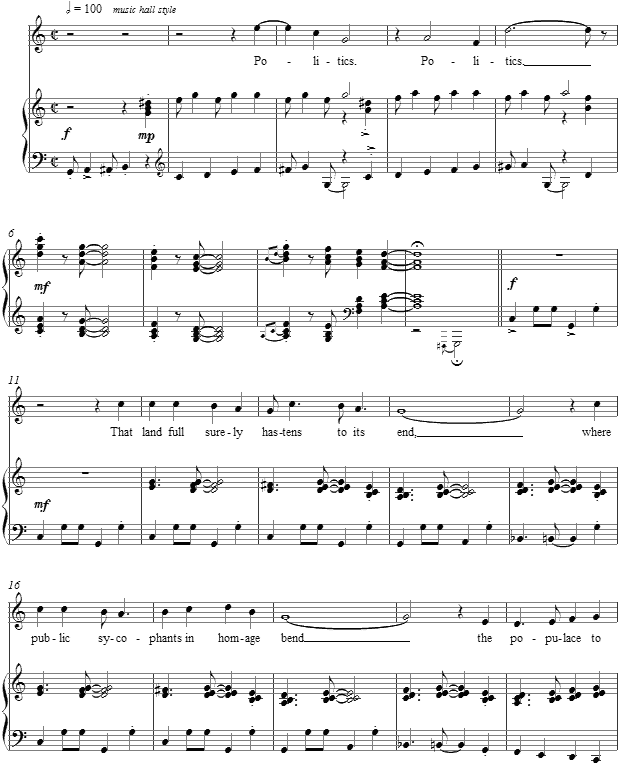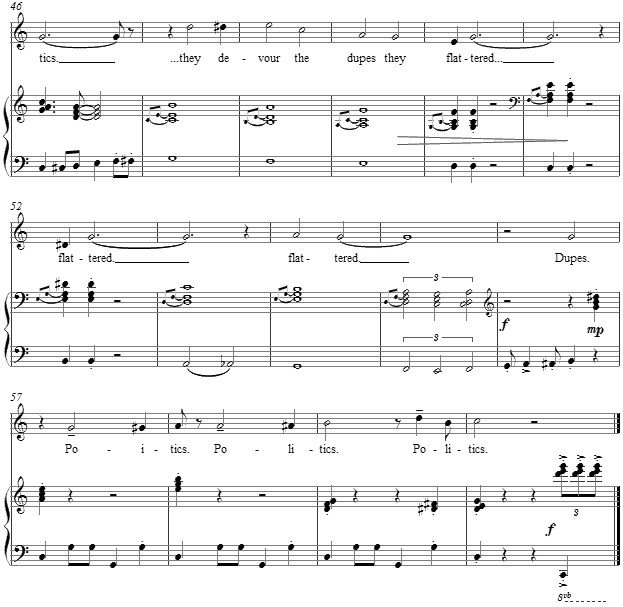Music and Texts of GARY BACHLUND
Vocal Music | Piano | Organ | Chamber Music | Orchestral | Articles and Commentary | Poems and Stories | Miscellany | FAQs
Politics - (2009)
Ambrose Bierce
for medium voice and piano
for Thomas Lifson
That land full surely hastens to its end
Where public sycophants in homage bend
The populace to flatter, and repeat
The doubled echoes of its loud conceit.
Lowly their attitude but high their aim,
They creep to eminence through paths of shame,
Till fixed securely in the seats of pow'r,
The dupes they flattered they at last devour.[ 3 pages, circa 1' 15" ]
Ambrose Bierce
The text is part of an anthology of Bierce's acerbic wit and perspective titled, Shapes of Clay, (1903). Last year I composed a setting to my own poem, Politics, which seems very close in time and sentiment, though over a century apart. Bierce (1842-1914) saw government with a suspicious eye, in the same way that Lord Acton [ 1 ] observed so famously. In trading some thoughts with the American Thinker editor, Thomas Lifson, he had said that Ambrose Bierce (and Mark Twain) were among poets whose work and meaning he enjoyed. Thus came this setting.
This brief text of two sentences' length breaks rather easily into two strophes, for which I added a short introduction by use of the title of the poem as well. Short snippets from musical Americana help open the setting, as a syncopated version of a phrase from "Turkey in the Straw" and a hint of "life is but a dream" collude to set up this music hall styled song.
The coda breaks the walking cut-time tempo bass line with whole note chords, as the text is repeated by inverting one phrase. The salient point Bierce wished us to see is that big government will "devour" the dupes which helped it into power. This might be argued by present day politicians -- though poorly -- but the twentieth century is ripe with so many examples of brutality towards a people by its own government, that any such argument against these facts becomes historically specious. The coda then concludes with repetitions of the title serving as the final lyric.
The score for Politics is available as a free PDF download, though any major commercial performance or recording of the work is prohibited without prior arrangement with the composer. Click on the graphic below for this piano-vocal score.
NOTES
[ 1 ] John Emerich Edward Dalberg Acton, first Baron Acton (1834–1902), was an English historian and moralist, now known simply as Lord Acton. He expressed the oft-quoted opinion in a letter to Bishop Mandell Creighton in 1887: "Power tends to corrupt, and absolute power corrupts absolutely. Great men are almost always bad men."
A clear-thinking defender of liberty, he is also remembered for the similar observations, chiding us to "...remember, where you have a concentration of power in a few hands, all too frequently men with the mentality of gangsters get control. History has proven that. All power corrupts; absolute power corrupts absolutely.”
Moreover, as a historian he argued "Socialism means slavery." As to those so willing to argue this point, Acton went further in his pronouncements, "There is no error so monstrous that it fails to find defenders among the ablest men."
A lesson worth noting, contemporary with Ambrose Bierce's assessment of politics.


